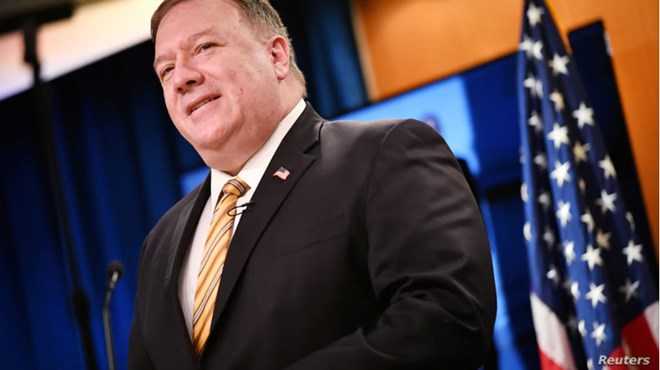
Thursday June 25, 2020
By Jeff Seldin

U.S. Secretary of State Mike Pompeo gives a news conference about dealings with China and Iran, and on the fight against the coronavirus disease (COVID-19) pandemic, in Washington, June 24, 2020.
WASHINGTON - Major victories against terror groups such as the Islamic State and al-Qaida have so far failed to stem their spread across the world, part of a worrisome trend identified in a new U.S. government report on terrorism.
The State Department’s annual terror assessment, released Wednesday, hailed “major strides” in Washington’s ongoing effort to curb terrorism, pointing to the defeat of the Islamic State (IS) caliphate in Iraq and Syria, the killing of former IS leader Abu Bakr al-Baghdadi and the killing of Hamza bin Laden, the son of al-Qaida founder Osama bin Laden.
Only the report found none of that was enough.
"Despite these successes, dangerous terrorist threats persisted,” it concluded.
Top U.S. officials argue part of the challenge is the wide array of threats — what the report describes as a “diverse and dynamic threat landscape,” from jihadist groups to white supremacists — and the world’s reliance on Washington to take the lead.
“This administration has taken on terrorist threats that other administration simply downplayed,” Secretary of State Mike Pompeo told reporters Wednesday. “But we're undaunted in our pursuit of bringing terrorists to justice.”
Other officials warn another problem is that terror groups are adapting, finding ways to persist and expand despite efforts to root them out, especially in the case of IS.
“We have to be mindful of the need to keep up the pressure,” State Department Counterterrorism Coordinator Nathan Sales told reporters.
“We’re seeing a continued evolution in ISIS from an entity that purported to control territory to one that is instead a network, a global network that reaches every inhabited continent,” he said, using an acronym for the terror group.
As part of its effort, the State Department’s Rewards for Justice program Wednesday doubled the reward for current IS leader Abu Ibrahim al-Hashimi al-Qurashi (aka Amir Muhammad Sa’id Abdal-Rahman al-Mawla) to $10 million.
Critics of Washington’s counterterrorism strategy worry that doing more of the same — going after key leaders like al-Qurashi — is not likely to yield better results.
“I don't think taking him off the battlefield ends the Islamic State threat at all, especially when a lot of that threat now is based outside of Iraq and Syria,” American Enterprise Institute Resident Fellow Katherine Zimmerman said.

“If [former IS leader] Baghdadi were still alive today, would the Islamic State in Iraq and Syria, would the Islamic State branches globally look significantly different? I don't think so,” she added.
And some experts and former officials caution there is a temptation to rely too heavily on military action as a quick fix.
“Terrorist groups are very easy to degrade. Once you get the intel and once you get the military assets in the right place, they’re extraordinarily easy to degrade,” former CIA Deputy Director Michael Morell told lawmakers Wednesday. “But they are also very easy to rebuild.”
According to some, the U.S. must address the conditions that give rise to terrorism in the first place — factors like poverty, ineffective governance and long-standing local grievances that make people feel disaffected.
“We need to think about how do we play a role in getting at the disease rather than just dealing with the symptoms,” Morell said.
Perhaps nowhere, of late, have terror groups been more successful at taking advantage of conditions that allow terrorism to thrive than in Africa’s Sahel region, where according to State Department data, terrorist attacks have increased 250% since 2018.
French-led efforts there have made a dent, most recently with a strike that killed the leader of al-Qaida in the Islamic Maghreb (AQIM), but sustained success has been harder to come by.
The G5 Sahel Joint Force, which formed in 2017 and includes Burkina Faso, Chad, Mali, Mauritania and Niger, “is not yet capable of disrupting the growing terrorist footprint,” the State Department report said.
The report also said efforts by Nigeria and neighboring countries has so far “proved unable to stop ISIS-WA’s [Islamic State-West Africa’s] advance in the region.”
Al-Qaida-aligned al-Shabab has also further entrenched itself in Somalia, retaining “de facto control over significant portions of the country, particularly in south-central Somalia,” the State Department found.
There is also growing fear about the spread of remnants of the IS caliphate across Asia, and in Southeast Asia in particular.
"Southeast Asian governments remained concerned about foreign terrorist fighters (FTFs) returning from Iraq or Syria and using their operational skills, connections, and experience to launch domestic attacks,” the report said.
Despite a series of losses, IS’s affiliate in the Philippines continued to draw both foreign fighters and new recruits, some from as far away as Europe, often transiting through Malaysia and Indonesia.
There is also mounting evidence that both IS and al-Qaida continue to reach out to the Americas, with State Department officials taking note of connections to Trinidad and Tobago, and of attempts by both “to exploit the region.”
At the same time, the report cites indications that both terror groups seem to be solidifying their presence in Syria, Iraq and even Afghanistan, while still finding ways to inspire attacks in Europe.
"There's still counterterrorism work to do," Pompeo said.